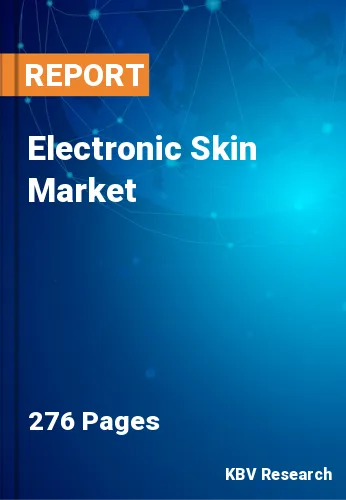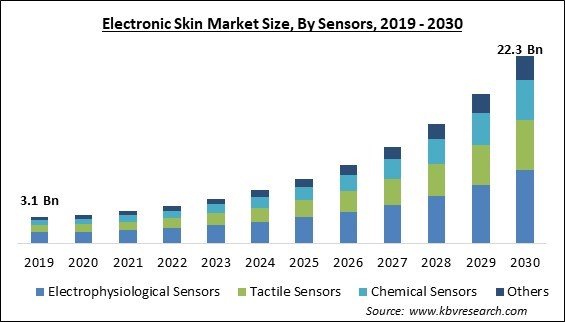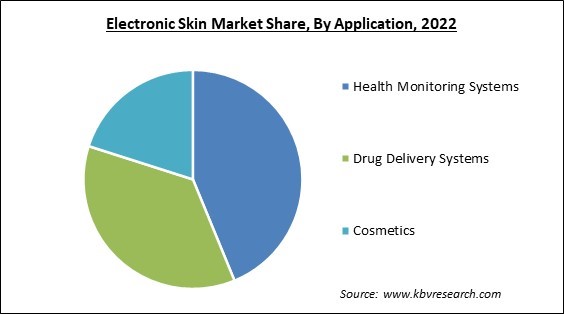
The Global Electronic Skin Market size is expected to reach $22.3 billion by 2030, rising at a market growth of 22.9% CAGR during the forecast period.
The development of stretchable conductors, stretchable circuits, photovoltaics, and electro-active polymers, among other components, are some of the most recognized inventions in the market. Therefore, Photovoltaic Systems segment generated $719.0 million revenue in 2022. Electro-mechanical and mechanical components have been reduced in size utilizing microfabrication processes as a result of ongoing developments in microelectro-mechanical systems (or MEMS) technology. The MEMS technology allows for the embedding of miniature electronic circuits and parts onto a flexible and thin substrate. Multifunctional semiconductors may now be integrated into an individual flexible substrate because of improvements in MEMS technology. Some of the factors impacting the market are Increasing prevalence of wearable devices in remote monitoring, growing concerns regarding chronic illnesses in the elderly population, and higher costs of electronic skin.

The adoption of electronic skin in the healthcare sector is anticipated to be accelerated by the high demand for e-skin solutions in the wearable electronics devices sector. During the forecast period, chronic dietary and lifestyle changes brought on by rising health concerns among the general population and growing fitness awareness are anticipated to propel the demand for wearable devices. Therefore, the increasing acceptance of wearable devices for monitoring and increasing awareness of electronic skin technology in the healthcare sector are anticipated to drive the market in the coming years. Additionally, the percentage of people aged 65 and beyond is quickly expanding all across the world. Nearly 1.5 billion elderly people—more than three times as many as there are now—will inhabit the planet by 2050. Furthermore, it is predicted that 16.0% of the world's population will be over the age of 60 by 2050. Chronic modifications to diet and lifestyle brought on by the rising prevalence of health issues among the general population and the rising popularity of fitness have resulted in increased health awareness among the elderly as well. As they are more susceptible to chronic conditions, the growing elderly population is one of the key drivers behind the growth of the market.
However, the creation and manufacturing of premium electronic skin can be pricey. A higher price range for electronic skin goods can make them less affordable to a wider user base due to the expense of materials, manufacturing procedures, and research. To accurately imitate natural skin, e-skin devices must be small, light, and discreet. It can be technically difficult and resource-intensive to miniaturize sensors and integrate them seamlessly. The demand for electronic skin could be hampered by high costs and problems with the e-skin material. A high initial setup cost for electronic skin products is a market restraint expected to prevent growth in the coming years. Moreover, The COVID-19 pandemic had a profound and immediate effect on the healthcare sector. Due to the unforeseen effects on the supply chain and the restrictions placed on manufacturing as well as supply operations during the early phases of the coronavirus pandemic. Due to the pandemic, numerous R&D projects across industries were put on hold or slowed down. This hampered the development of cutting-edge e-skin technology and postponed the release of new products.
Based on application, the market is segmented into health monitoring systems, drug delivery systems, and cosmetics. The health monitoring systems segment procured the highest revenue share in the market in 2022. Because more e-skin products are being used in many medical fields like cardiology, neurology, diabetes, and others, the health monitoring segment is growing. The patient can apply patches to test heart, muscle, and brain activity on their own, owing to the technology's user-friendliness. Additionally, e- skin's wearable and user-friendly design enables patients to place patches for the heart, muscles, and brain and perform tests independently.

By sensors, the market is divided into tactile sensors, chemical sensors, electrophysiological sensors, and others. The tactile sensors segment garnered a remarkable growth rate in the market in 2022. The widespread use of this technology for robotic operation, human-machine interfaces, and physiological monitoring is one of the segment's main growth drivers. The growth of the wearable technology market is anticipated to be boosted by technological innovation and advancements in this area. The development of flexible tactile sensors with high sensitivity, broad detecting range, and the capacity to detect 3D forces is in progress, which will boost the demand for tactile sensors.
On the basis of component, the market is classified into stretchable circuits, photovoltaics systems, stretchable conductors, and electroactive polymers. The electroactive polymers (EAP) segment recorded a significant revenue share in the market in 2022. EAP are polymers that adapt in terms of dimension to the applied electrical field. These electrically conductive electroactive polymers have a large, reversible ion storage capacity. These materials belong to a unique class since they can adapt to the surface of various shapes and can withstand high strain and low moduli. These features are gaining popularity for use in a variety of wearable sensor applications that interface with soft tissue.
Based on product, the market is characterized into electronic skin suits and electronic patches. The electronic patches segment procured a considerable growth rate in the market in 2022. Actuators, sensors, connectivity, and energy storage are all included in electronic skin patches. The popularity of electronic skin patches is growing as a result of their use in numerous personal care products. While allowing for continued close communication with doctors, this technology prevents patients from visiting hospitals. The electronic patches are utilized for self-monitoring diabetes, temperature sensing, in- and out-patient monitoring, motion sensing, and remote patient monitoring.
| Report Attribute | Details |
|---|---|
| Market size value in 2022 | USD 4.4 Billion |
| Market size forecast in 2030 | USD 22.3 Billion |
| Base Year | 2022 |
| Historical Period | 2019 to 2021 |
| Forecast Period | 2023 to 2030 |
| Revenue Growth Rate | CAGR of 22.9% from 2023 to 2030 |
| Number of Pages | 276 |
| Number of Table | 449 |
| Report coverage | Market Trends, Revenue Estimation and Forecast, Segmentation Analysis, Regional and Country Breakdown, Companies Strategic Developments, Company Profiling |
| Segments covered | Sensors, Component, Product, Application, Region |
| Country scope | US, Canada, Mexico, Germany, UK, France, Russia, Spain, Italy, China, Japan, India, South Korea, Singapore, Malaysia, Brazil, Argentina, UAE, Saudi Arabia, South Africa, Nigeria |
| Growth Drivers |
|
| Restraints |
|
Region wise, the market is analyzed across North America, Europe, Asia Pacific, and LAMEA. The North America segment recorded the largest revenue share in the market in 2022. The market growth in North America is being helped by an increasing elderly population as well as an increase in new product launches. The regional market is expanding as a result of ongoing technical development and advantageous reimbursement policies. Major firms in the sector are also present, which are expediting the commercialization and development of innovative electronic skins.
Free Valuable Insights: Global Electronic Skin Market size to reach USD 22.3 Billion by 2030
The market research report covers the analysis of key stakeholders of the market. Key companies profiled in the report include Medidata Solutions, Inc. (Dassault Systems SE), Xsensio S.A., Xenoma Inc., VivaLNK, Inc., iRhythm Technologies, Inc., Renesas Electronics Corporation, QUAD Belgium nv/sa, Koninklijke Philips N.V., and ROTEX.
By Sensors
By Component
By Application
By Product
By Geography
This Market size is expected to reach $22.3 billion by 2030.
Increasing prevalence of wearable devices in remote monitoring are driving the Market in coming years, however, High costs of electronic skin restraints the growth of the Market.
Medidata Solutions, Inc. (Dassault Systems SE), Xsensio S.A., Xenoma Inc., VivaLNK, Inc., iRhythm Technologies, Inc., Renesas Electronics Corporation, QUAD Belgium nv/sa, Koninklijke Philips N.V., and ROTEX.
The Stretchable Circuits segment acquired the highest revenue in the Market by Component in 2022; thereby, achieving a market value of $7.1 billion by 2030.
The Electrophysiological Sensors segment is leading the Market by Sensors in 2022; thereby, achieving a market value of $8.7 billion by 2030.
The North America region dominated the Market by Region in 2022 and would continue to be a dominant market till 2030; thereby, achieving a market value of $8.4 billion by 2030.
Our team of dedicated experts can provide you with attractive expansion opportunities for your business.
